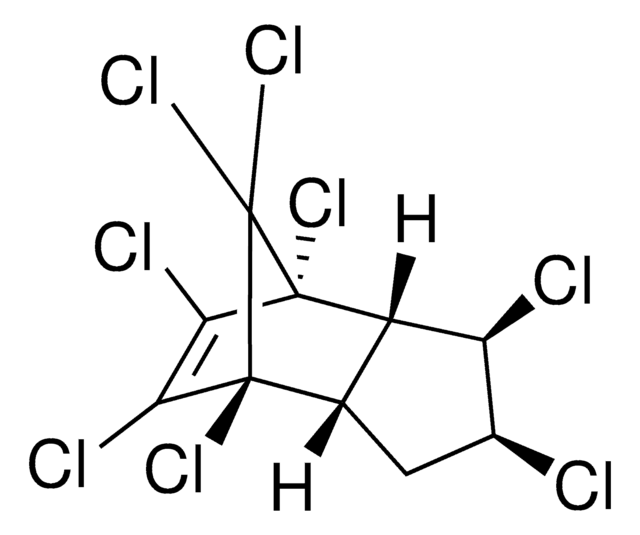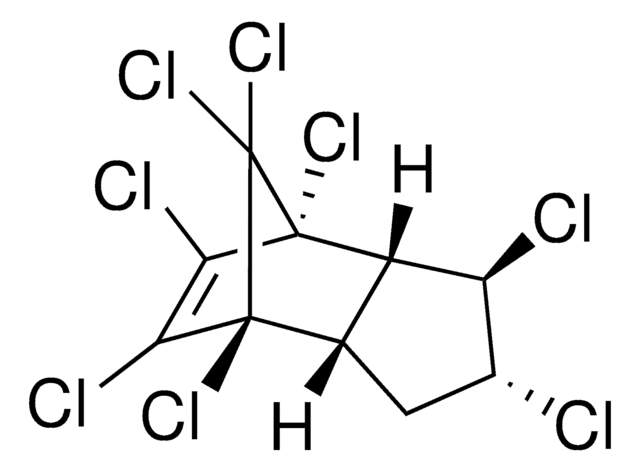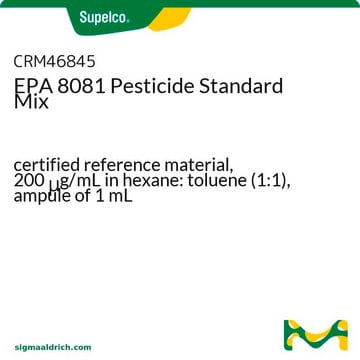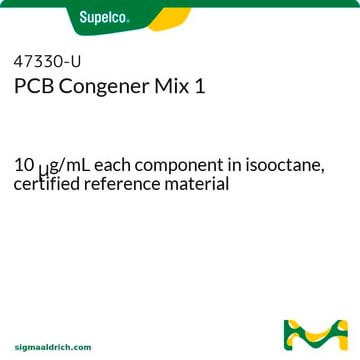53797
Chlordane (mélange d′isomères)
certified reference material, TraceCERT®, Manufactured by: Sigma-Aldrich Production GmbH, Switzerland
About This Item
Produits recommandés
Qualité
certified reference material
TraceCERT®
Niveau de qualité
Description
technical mixture
Gamme de produits
TraceCERT®
Durée de conservation
limited shelf life, expiry date on the label
Fabricant/nom de marque
Manufactured by: Sigma-Aldrich Production GmbH, Switzerland
Format
neat
Température de stockage
−20°C
InChI
1S/C10H6Cl8/c11-3-1-2-4(5(3)12)9(16)7(14)6(13)8(2,15)10(9,17)18/h2-5H,1H2
Clé InChI
BIWJNBZANLAXMG-UHFFFAOYSA-N
Vous recherchez des produits similaires ? Visite Guide de comparaison des produits
Catégories apparentées
Description générale
Chlordane is a synthetic organochlorine pesticide that belongs to the group of chlorinated cyclodiene. They are commonly resistant to photolytic, chemical, and biological degradation, and have relatively long half-lives. Chlordane manufactured as a technical form is composed of more than 120 structurally related compounds. The predominant isomers in technical chlordane are cis-chlordane (19%), trans-chlordane (24%), cis-nonachlor (2.7%), trans-nonachlor (9.7%), and heptachlor (10%).
Chlordane has to be monitored in the Multiannual Control Programmes for Pesticides Residues (MACP), run within the EU and EFTA in/on products of animal origin. Maximum residue levels (MRLs) have been set according to Reg (EC) No 149/2008 for chlordane (sum of cis-and trans chlordane) for various products of plant and animal origin from 0.01 to 0.005 mg/kg.
Technical chlordane was used mostly as an agricultural pesticide on corn and citrus, for home lawns and gardens, as well as a termiticide in house foundation. Chlordane blocks the gamma-aminobutyric acid (GABA)-gated chloride channels in the central nervous system, resulting in hyperexcitation and convulsions.
The use of chlordane as a pesticide has been banned in the EU since 1981 by Council Directive 79/117/EEC of 21 December 1978 which prohibited the placing on the market and use of plant protection products containing certain substances.
Application
It is intended to be used as a certified reference material (CRM) for calibration in chromatography and other analytical techniques. Chlordane in CRM may also find its use as described below:
- Study of joint toxic effects of polystyrene nanoparticles and chlordane and hexachlorocyclohexane pesticides on Caenorhabditis elegans
- Development of biomonitoring equivalents for chlordane and toxaphene with application to the general Canadian population
- To study chlordane, PCBs, and synthetic musk fragrances in a backwater area in the Upper Mississippi River and Iowa River
- QuEChERS method and a single instrumental analysis to detect a broad range of persistent organic pollutants (POPs) in white sturgeon liver and gonad tissues as an indication of exposure
- To investigate the effect of chlordane, heptachlor, and mirex, on hormonal regulation of the force of myometrial contractions in cow
Informations légales
Mention d'avertissement
Danger
Mentions de danger
Conseils de prudence
Classification des risques
Acute Tox. 3 Dermal - Acute Tox. 3 Oral - Aquatic Acute 1 - Aquatic Chronic 1 - Carc. 2
Code de la classe de stockage
6.1C - Combustible acute toxic Cat.3 / toxic compounds or compounds which causing chronic effects
Classe de danger pour l'eau (WGK)
WGK 3
Faites votre choix parmi les versions les plus récentes :
Certificats d'analyse (COA)
Vous ne trouvez pas la bonne version ?
Si vous avez besoin d'une version particulière, vous pouvez rechercher un certificat spécifique par le numéro de lot.
Déjà en possession de ce produit ?
Retrouvez la documentation relative aux produits que vous avez récemment achetés dans la Bibliothèque de documents.
Notre équipe de scientifiques dispose d'une expérience dans tous les secteurs de la recherche, notamment en sciences de la vie, science des matériaux, synthèse chimique, chromatographie, analyse et dans de nombreux autres domaines..
Contacter notre Service technique











